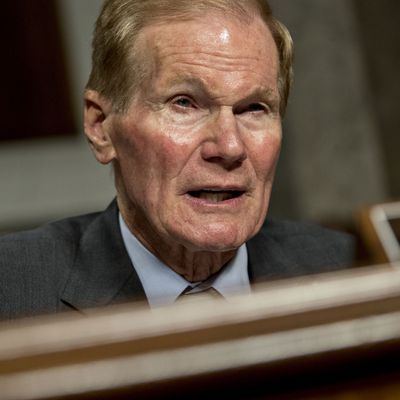
When it came to managing the U.S. Senate, the supposed ace in the hole for Republicans this year was supposed to be the political tremors experienced by the ten Democratic senators up for reelection in 2018 who were from states carried by Donald Trump last year. It’s not really working out that way.
So far the only controversial thing the Senate has been able to pass was the overturning of an Obama administration regulation that kept states from banning use of federal funds by Planned Parenthood. And that happened only because (a) it was under the aegis of the Congressional Review Act that prevents filibusters, (b) one ailing Republican, Johnny Isakson, arrived on the floor with a walker, and (c) Vice-President Mike Pence broke a tie vote. For all their occasional talk of bipartisanship and willingness to work with Donald Trump, Senate Democrats haven’t broken ranks yet.
It was widely thought the question of confirming Neil Gorsuch for the Supreme Court might break the mold, partially because he did well in his confirmation hearings, and partially because the Democratic leadership has signaled it will pursue an unprecedented SCOTUS filibuster, which in turn is very likely to lead to the invocation of the “nuclear option” to eliminate future SCOTUS filibusters.
So far just two of the 11 red-state Senate Democrats have indicated that they will vote to confirm Gorsuch, and they do happen to be from two states Trump carried by massive landslides, Joe Manchin of West Virginia and Heidi Heitkamp of North Dakota. Five Democrats from states carried by Trump, however, have publicly announced they will join the filibuster: Tammy Baldwin of Wisconsin, Robert Casey of Pennsylvania, Bill Nelson of Florida, and Gary Peters and Debbie Stabenow of Michigan. All but Peters are up for reelection in 2018. Nelson was the real revelation: He’s a longtime centrist who had voted for cloture when fellow Democrats sought to filibuster Samuel Alito’s confirmation in 2006, and who faces a potentially crazy-expensive reelection challenge from Governor Rick Scott next year. Call it a matter of fearing “the base” more than the opposition, or call it revenge for the GOP’s treatment of Merrick Garland, or call it a recognition that the GOP won’t cut Democrats any slack for playing pretty: Any way you slice it, there’s a new calculation Democrats seem to be making on votes like this. It may well be they’re thinking the wind may blow in a very favorable direction in this particular midterm.
It’s unclear, however, what is going to happen in the end, since according to the Washington Post’s whip count, 12 Democrats — including four (Sherrod Brown of Ohio, Joe Donnelly of Indiana, Claire McCaskill of Missouri, and Jon Tester of Montana) from states carried by Trump — are publicly undecided. Gorsuch needs six more votes to break the filibuster. It’s hard to imagine Brown voting to help Gorsuch get confirmed, and there is at least one blue-state senator (Pat Leahy) who has made noises about not favoring SCOTUS filibusters. So it will be close, but either way, there are few indications the GOP can regularly count on any Democratic senators, no matter where they are from and how tough a row they have to hoe in 2018. And that’s definitely a problem for a Republican Party that is having its own discipline issues of late.






























